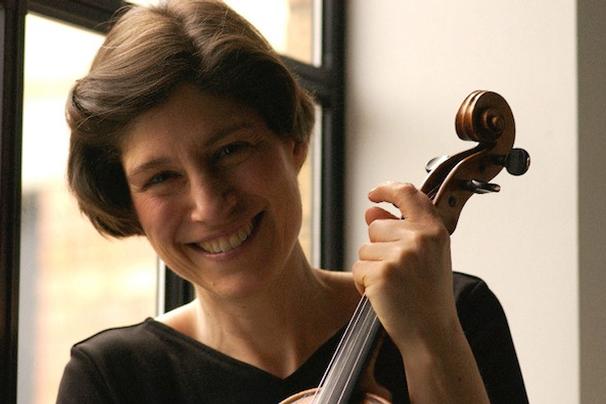Kashkashian delivers an envelope-pushing program at SoBe string festival

Violist Kim Kashkashian performed a wide-ranging recital Wednesday night in Miami Beach.
The SoBe Arts’ American Masterworks String Festival continued on Wednesday night with violist Kim Kashkashian offering a challenging program at the Little Stage Theater in Miami Beach. After Lara St. John’s more lightweight opening concert the previous evening, Kashkashian played seven works that represented diverse stylistic influences and did not shy away from the more astringent side of musical Americana.
The intimate theater on the SoBe Institute of the Arts campus is a wonderful space to hear music. With seating on both sides of the main stage area, the wall between artist and audience is virtually nonexistent. A bright, clear acoustic allows the listener to hear nuances and inner detail that become blurred in larger, acoustically superior halls.
Along with Yuri Bashmet and Paul Neubauer, Kashkashian is one of the preeminent exponents of the viola as a solo instrument. Often relegated to supporting lines in orchestral and chamber music, the instrument’s dark sound shone brilliantly in Kaskashian’s hands. Her sterling musicianship never calls attention to itself, displaying the music with x-ray precision and clarity.
Contrasting immigrant musical influences with homegrown voices, Kashkashian opened with Alan Hovhaness’ unaccompanied Chahagir, a brooding Armenian-inspired meditation that displayed her rich, voluptuous sonority.
Wild Grass by Zhou Long, winner of the 2011 Pulitzer Prize for music, adapted Asian scales and acerbic strokes of the bow. The score requires unconventional fingering near the top of the board and close to the bridge. Brief suggestions of Chinese folk melody appear through the harmonic haze of this mesmeric blend of traditions from East and West. A merciless test of technical fluency and dramatic penetration, Kashkashian’s performance was riveting, a vivid meeting of boundary pushing composer and visionary interpreter.
Inspired by the writings of Chinese poet Du Fu, Seven for the Flowers Near the River is a suite by Stephen Paulus that alternates songful lines and spiky dance rhythms, depicting flowers in fields, rivers and the cosmos.. Best known for his operas and choral works, Paulus has created impressionistic snapshots of rhapsodic lyricism tinged with bitters. The rounded beauty of Kashkashian’s sound could turn harsh and gutsy when appropriate, matched by the pianistic dexterity of Martin Kennedy.
Vincent Persichetti’s solo Parable is a long recitative, the legato lines cast from the lyric atonality of Alban Berg. By contrast Christopher Theofanidis’ Flow My Tears is a Bachian sarabande, the unaccompanied viola singing in austere melodic strophes.
Those who know 103-year old Elliot Carter as an uncompromising master of serialism would be surprised to hear his earlier work. A protégé of Aaron Copland, Carter wrote numerous scores in the 1940’s that channeled his mentor’s Americana influences before embracing the revolutionary world of Schoenberg and the Second Viennese School. His Elegy, originally written for cello in 1943, is an evocative portrait of prairie nostalgia that could have come from one of Copland’s ballet scores.
In the second set of Copland’s Old American Songs, Kashkashian’s molten tones became the instrumental baritone voice. Her unhurried, song-like version of At the River and a brisk, deft Zion’s Walls were striking. The instrument’s high end took a rare spotlight in a take no prisoners run at Ching-A-Ring Chaw, Kennedy keeping pace adeptly.
Kashkashian’s venturesome repertoire produced a concert both unconventional and memorable.
Posted in Uncategorized
Leave a Comment
Thu Dec 8, 2011
at 12:31 pm
No Comments






